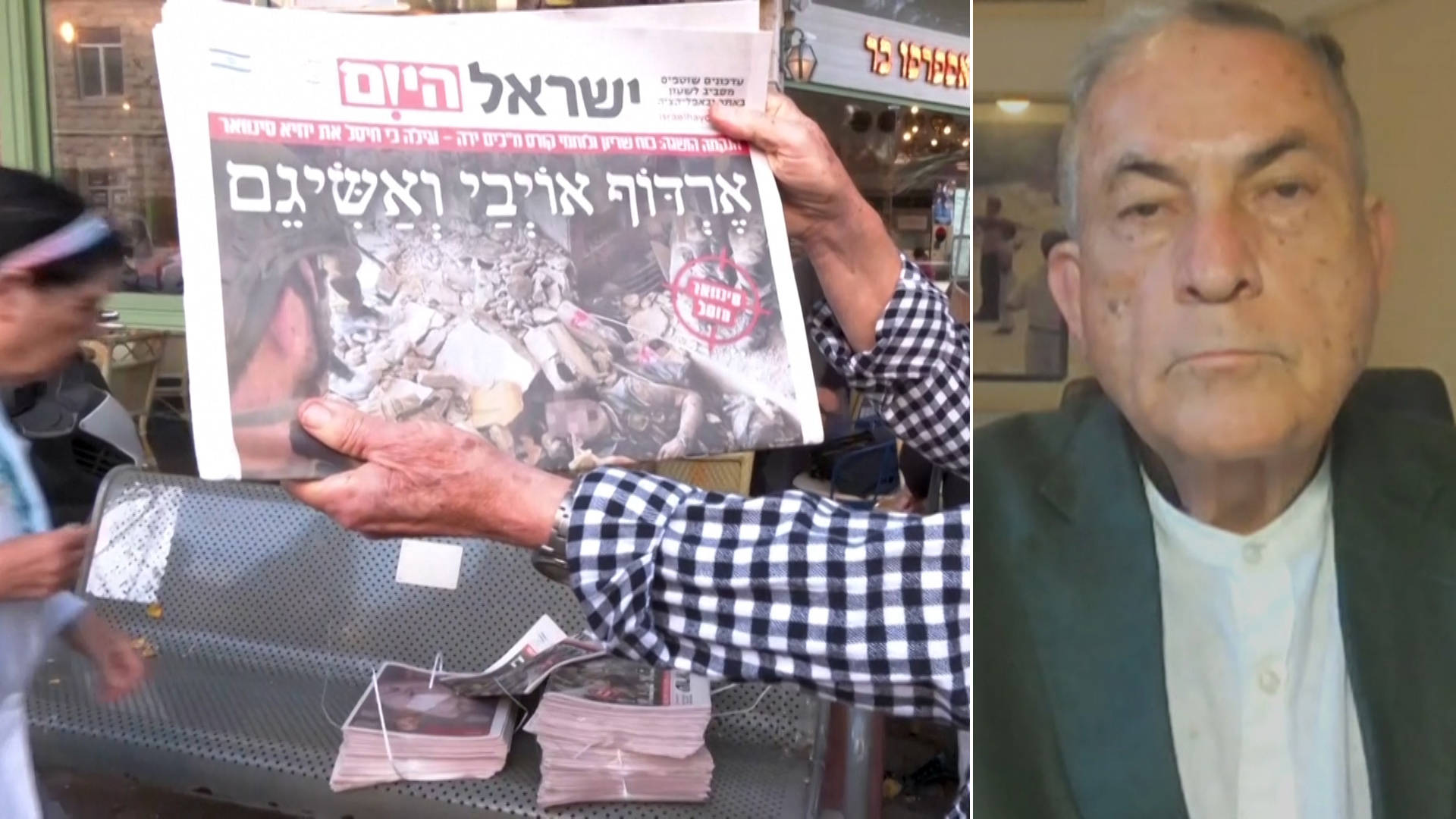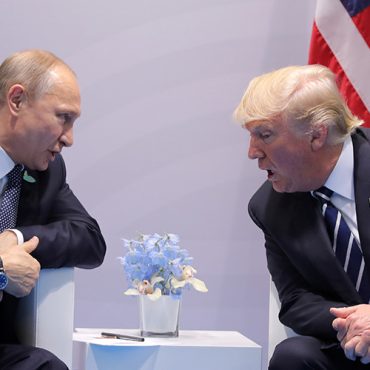This is a rush transcript. Copy may not be in its final form.
AMY GOODMAN: This is Democracy Now!, democracynow.org, The War and Peace Report. I’m Amy Goodman.
The Israeli newspaper Haaretz is reporting Israeli Prime Minister Benjamin Netanyahu is meeting today with ministers and heads of security agencies at the military headquarters in Tel Aviv.
For more, we go to Tel Aviv, where we’re joined by Gideon Levy, award-winning Israeli journalist and author, columnist for the newspaper Haaretz, where he’s also a member of the editorial board.
Gideon, welcome back to Democracy Now! Can you talk about the response in Israel to Israel’s killing of the Hamas leader, Yahya Sinwar?
GIDEON LEVY: As you can imagine, Amy, there is a lot of sense of joy and pride. The media is encouraging it, obviously. The main headline of the most popular newspaper in Israel, Yedioth Ahronoth, says, “The Satan was assassinated.” The mood is of big content and of really feeling that justice prevailed and this Hitler was assassinated. Nobody asks what will be the day after. Nobody asks what did Israel benefit out of it. We are all celebrating the killing of the Satan.
AMY GOODMAN: Can you talk about what the families of hostages are saying, where you are, in the city of Tel Aviv? It seems like there wasn’t — they didn’t skip a beat yesterday in their protest of Netanyahu as they demanded a ceasefire.
GIDEON LEVY: Yeah, they are torn, because they are clever enough to understand that the killing of Sinwar does not mean the release of their beloved ones. On the contrary, it might even postpone it or maybe even miss it totally, because as long as Sinwar was alive, there was a partner. Now with whom will Israel deal about any kind of hostage deal, if Israel is at all interested in?
The feeling is that Netanyahu, now he’s boosted by much more support in Israel after this success, this military success of assassinating Sinwar. For him, the hostages were and still are not the first priority. And why would it now happen after it didn’t happen for a whole year? I doubt it. Why would Hamas go for it now? When it’s so beaten and there is so little to lose, why would they now care about releasing the hostages, almost their last asset? So, I understand that the families — they don’t speak in one voice, and it shouldn’t be one voice. But at least part of them are really in anxiety that maybe the last chance for releasing their beloved one was missed.
AMY GOODMAN: Can you talk about what we understand of how Yahya Sinwar was killed? He was not in the tunnels. The video that Israel is putting out of him sitting in a chair, he was in Rafah. Who the forces were who moved into that place, and the significance of that, Gideon Levy?
GIDEON LEVY: First of all, it was totally incidental. I must praise the Israeli information system of propaganda, or hasbara, as they call it. At least they admitted that it was not planned. They didn’t try to show it as if it was a very planned operation. It wasn’t. And he was killed. First they bombed this house where he was, and then a drone got into the house and showed him in his last moments. Quite pathetic video. And then they shot him in his head, as we saw, twice at least, because there are two holes in his head. And they killed him. He was masked, as you saw, trying to hide from being recognized.
But in any case, it doesn’t matter much. The fact is that Israeli intelligence couldn’t find him for one year. The fact is that Israeli intelligence couldn’t find the hostages for one year in a very small piece of land, Gaza Strip, where Israel is controlling now for one year. And finally, they found him. I mean, it was so expected. How couldn’t he be found finally, when Israel is searching after him for so long and really destructing every building and every street in Gaza? So, finally, they succeeded, obviously. It’s not a hell of a success, but in Israel they are quite happy about it. And I can understand the sentiment.
AMY GOODMAN: So, where does what Israel plans to do with Iran fit into this story?
GIDEON LEVY: I hope it doesn’t fit. And I’m very afraid that it does fit, because Netanyahu now feels much more secure. Those last so-called, or not so-called, military successes and achievements started with the beepers and the pagers and continued with the assassinations of all the leaders of Hamas and Hezbollah. All those things just give him a boost to continue the same way that he believes in, the only way he believes in, namely, doing everything by force, doing everything throughout aggressive attacks on the rival, on the enemy.
And he might think the same now about Iran, because Iran is the next object. When the United States is so passive, so passive, really in a shameful way, he feels he has a free carte blanche to continue. And he has a carte blanche to continue, because the United States never stopped him, even not for a moment. He totally ignored the advices of the American administration, rightly so. Why would he bother about presidential advices if the arms continue to flow and the ammunition continues to flow? So, I’m very afraid that this will encourage him also to go to all kind of [inaudible] operations, grand operations also in Iran. And then it can be really frightening, because the outcome might be really catastrophe. And maybe he will succeed. Who knows? I mean, until now, we were all scared of invading Rafah. And look, he invaded Rafah, and nothing happened.
AMY GOODMAN: I want to turn to Democratic presidential nominee Kamala Harris praising the assassination of Sinwar as progress toward the elimination of Hamas. She spoke in Milwaukee, Wisconsin, where she was campaigning Thursday.
VICE PRESIDENT KAMALA HARRIS: Hamas is decimated, and its leadership is eliminated. This moment gives us an opportunity to finally end the war in Gaza. And it must end such that Israel is secure, the hostages are released, the suffering in Gaza ends, and the Palestinian people can realize their right to dignity, security, freedom and self-determination. And it is time for the day after to begin.
AMY GOODMAN: As we wrap up, Gideon Levy, if you can talk about this? I mean, in a letter, apparently, from Biden saying that they will end arms sales or limit them after 30 days — a top former State Department official said, “Where is it in the law to say if they are starving Gaza, stopping humanitarian aid to Gaza, that you wait 30 days?”
GIDEON LEVY: Even before the 30 days, whatever Vice President Kamala Harris said are wonderful words. I could sign on each word and word that she said. This is really a noble idea to stop this war, to let the Palestinians have dignity and freedom and security, and to let Israel’s security — it’s wonderful. The question is: What did the American administration do to promote those things in the recent year or years? And the answer is nothing, because whatever the administration said was in total contradiction to its deeds. When you continue to supply in an unconditioned way arms and ammunition to Israel, it means you want it to use it. And what is the use of it? Killing 17,000 children in Gaza. That’s the use of the American ammunition. So —
AMY GOODMAN: Gideon Levy, we’re going to have to leave it there. I thank you so much for being with us, award-winning Israeli journalist and author, columnist with Haaretz and on its editorial board.
When we come back, we go to Gaza. Sha’ban al-Dalou would have turned 20 years old this week, but he died in a fireball when Israel attacked Al-Aqsa Hospital, setting off a massive fire in a makeshift tent area housing displaced Palestinians. Back in 20 seconds.











Post comments (0)